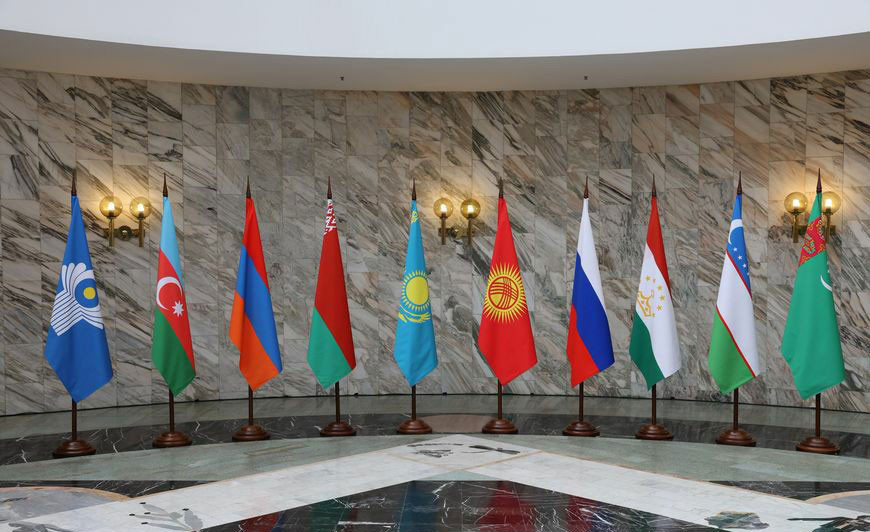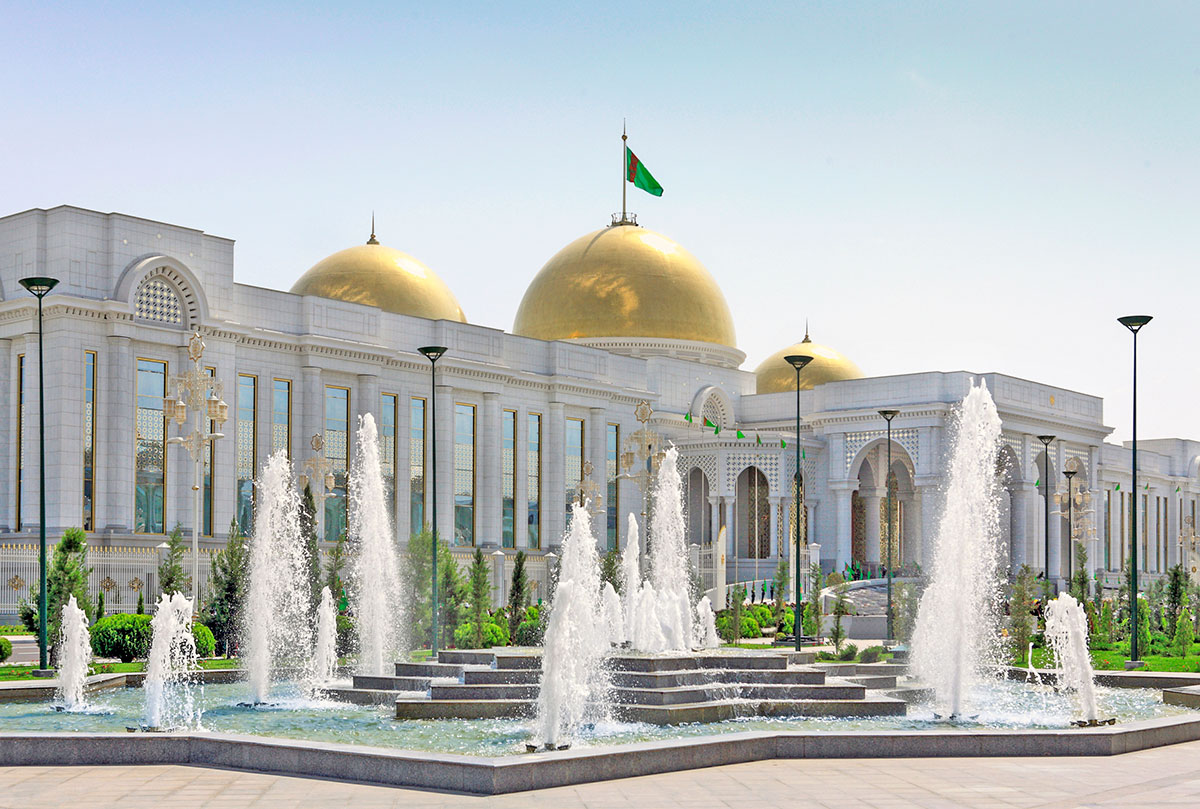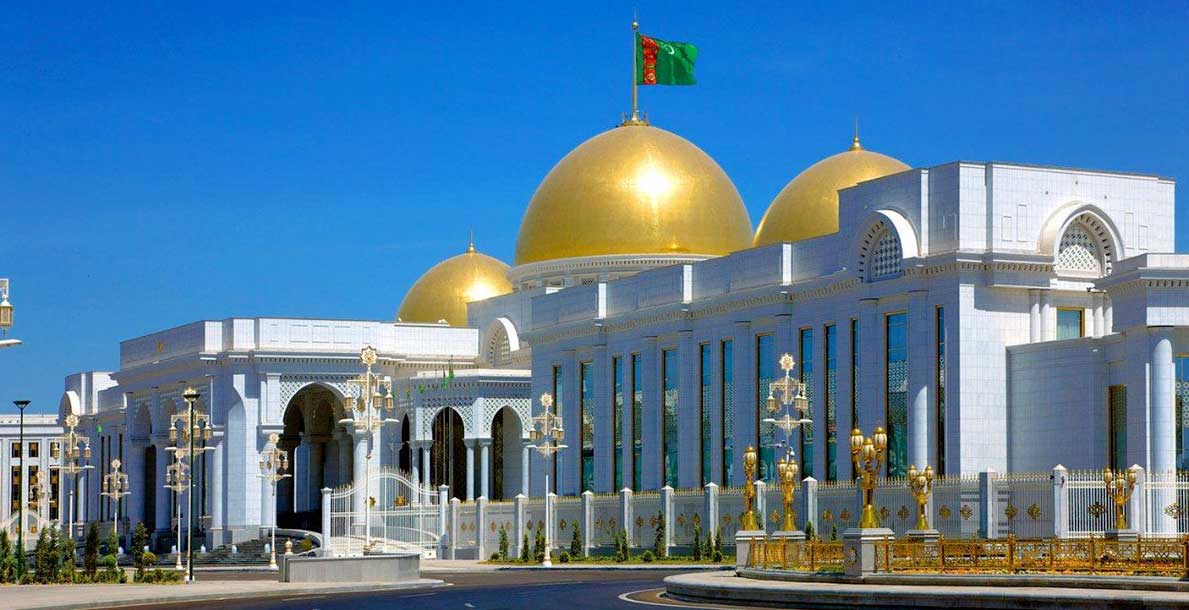Expanding close and multidimensional ties with closest neighbors is a key goal of Turkmenistan’s foreign policy. As part of Turkmenistan’s Foreign Policy Framework for 2017-2023, highest priority is accorded to partnerships with countries of the region in accordance with the principles of mutual understanding and trust which serves as a main factor of preserving and consolidating peace and security in Central Asia. Turkmenistan therefore consistently develops relations of good-neighborliness and mutually beneficial cooperation with nations of the region both on bilateral level and within reputable international organizations, primarily the United Nations.
The Republic of Uzbekistan is one of Turkmenistan’s closest neighbors. Our nations and peoples share much in terms of historical development, culture and traditions. Advantageous geographical location of both countries in the center of the Asian continent is of key importance. Being placed at the important crossroads of trade and economic, transport and communication corridors, Turkmenistan and Uzbekistan engage in coordinated cooperation to develop most promising routes in the East–West and North–South directions.
Having inherited ancient and unique cultures, Turkmenistan and Uzbekistan collaborate in the field of care and preservation of historical and cultural monuments. Inscribed in the UNESCO World Heritage List and being of unique value for current and future generations, archaeological monuments and architectural ensembles of Nisa, Merv, Kunya-Urgench, Samarkand, Bukhara, Khiva and other centers, where foundation of the modern civilization was laid thousands of years ago, currently attract attention not only of numerous tourists but also of scientists and researchers from major research and education centers of the world.
Being environmentally responsible and preserving natural wealth, Turkmenistan and Uzbekistan work together towards rational use of water and energy resources and protecting the environment.
Since the establishment of diplomatic relations on 7 February 1993, our nations amassed extensive experience of friendly and fruitful cooperation both on bilateral level and in multilateral format. Progressive development of Turkmen–Uzbek ties is based on sustained political dialog, expansion of spheres of commercial and economic partnership, and on close interaction in a variety of areas of humanitarian cooperation.
Turkmenistan respects the constructive foreign policy pursued by the Republic of Uzbekistan and driven by the national interests of the country. Uzbekistan, in return, respects and supports the globally recognized international legal status of permanent neutrality of Turkmenistan, having co-sponsored the relevant UN GA Resolutions in 1995 and 2015. Being a peaceful country, Uzbekistan remains committed to the course of nonalignment with any military and political blocs; not admitting the deployment on its territory of foreign military bases and objects and non-participation of the country’s military personnel in peacekeeping operations abroad; and peaceful, political settlement of all disputes and conflicts
Turkmenistan and the Republic of Uzbekistan make a worthwhile contribution to fostering peace, security and sustainable development. The dialog on pertinent issues of our time is complemented by constructive cooperation and mutual support for initiatives within reputable international structures, primarily the United Nations. More specifically, Uzbekistan co-sponsored several major documents initiated by Turkmenistan in the field of secure transit of energy to world markets, global transport cooperation and other important issues on the international agenda.
High-level contacts based on mutual trust are key factors of progressive dynamics of cooperation. Presidents Gurbanguly Berdimuhamedov and Shavkat Mirziyoyev demonstrate an example of positive consideration and effective resolution of key issues of the mutually beneficial partnership in the interest of the two countries and their peoples. Official meetings and talks, contacts on the margins of international summits and high-level forums serve as ample evidence of that.
It is worth mentioning that President Shavkat Mirziyoyev paid his first state visit as the leader of Uzbekistan to Turkmenistan in March 2017. High-level talks held in Ashgabat, the signing of the Agreement on Strategic Partnership between Uzbekistan and Turkmenistan and a remarkable package of other documents opened a new page in the history of bilateral relations.
The slogan celebrated throughout 2018, “Turkmenistan Is the Heart of the Great Silk Road”, represents our country’s openness towards consolidation of international efforts in establishing an advanced, hi-tech transport and communication infrastructure aimed at promoting lofty goals of peace, security and sustainable development.
Uzbekistan announced 2018 as the Year of Support of Active Entrepreneurship, Innovative Ideas and Technologies which implies aspiration to implement breakthrough reforms in economy, industry, scientific and technological development of the country. Effective realization of the Strategy of Actions for Five Priority Areas of the Republic of Uzbekistan for 2017-2021 is among key and primary tasks of the foreign policy of the brotherly country. The goal of the strategy is to ensure radical increase in the efficiency of ongoing reforms, create conditions for comprehensive and accelerated development of the state and society, modernize the country and liberalize all sphere of life. During these 5 years, within Uzbekistan’s Development Strategy for 2017-2021, 657 investment projects with a total value of 40 billion dollars are scheduled for implementation, and industrial output is planned to be increased one and a half times.
Rich resource base and growing export capacity of Turkmenistan and Uzbekistan serve as a solid foundation for increasing volumes and expanding the range of bilateral trade, strengthening economic partnership, scientific and technical cooperation. In recent years, the industrial component has notably prevailed in export and import operations between our countries. More precisely, Turkmenistan supplies petrochemical products, textiles, and produce of food and processing industries to the brotherly country. In return, Uzbekistan exports chemicals, construction materials, household goods, electric equipment, metal products, equipment and vehicles to Turkmenistan. The Agreement on Economic Cooperation for 2018-2020 and Agreement on Mutual Delivery of Goods foster a legal environment conducive for scaling up the partnership.
Intensification of cooperation between Turkmenistan and Uzbekistan is discussed at meetings of the Joint Turkmen–Uzbek Commission for Trade-Economic, Scientific-Technical and Cultural Cooperation. The regular fourteenth session of the Intergovernmental Commission took place on 1-2 March 2018 in Tashkent and reviewed activities to facilitate effective implementation of previously reached agreements. Exhibitions and business forums, direct contacts between business circles of the two countries significantly contribute to the fruitful commercial and economic partnership. In this context, it is worth mentioning that the Uzbekistan National Industrial Exhibition was held on 29-31 March 2018 in Ashgabat.
Further convergence of our peoples and mutual enrichment of cultures are facilitated by cultural and humanitarian ties. The Program of Cooperation between the Government of Turkmenistan and the Government of the Republic of Uzbekistan in the Cultural-Humanitarian Sphere for 2017-2019 signed in 2017 became a landmark event. It provides for concerts of cultural and art figures of the two countries, exhibitions and forums, creative festivals and conferences.
The upcoming state visit to the Republic of Uzbekistan by the President of Turkmenistan, Gurbanguly Berdimuhamedov, will be an event of historical significance that will upgrade the truly brotherly relations based on centuries-old traditions of good-neighborliness, mutual respect and fruitful cooperation.
The Republic of Uzbekistan is one of Turkmenistan’s closest neighbors. Our nations and peoples share much in terms of historical development, culture and traditions. Advantageous geographical location of both countries in the center of the Asian continent is of key importance. Being placed at the important crossroads of trade and economic, transport and communication corridors, Turkmenistan and Uzbekistan engage in coordinated cooperation to develop most promising routes in the East–West and North–South directions.
Having inherited ancient and unique cultures, Turkmenistan and Uzbekistan collaborate in the field of care and preservation of historical and cultural monuments. Inscribed in the UNESCO World Heritage List and being of unique value for current and future generations, archaeological monuments and architectural ensembles of Nisa, Merv, Kunya-Urgench, Samarkand, Bukhara, Khiva and other centers, where foundation of the modern civilization was laid thousands of years ago, currently attract attention not only of numerous tourists but also of scientists and researchers from major research and education centers of the world.
Being environmentally responsible and preserving natural wealth, Turkmenistan and Uzbekistan work together towards rational use of water and energy resources and protecting the environment.
Since the establishment of diplomatic relations on 7 February 1993, our nations amassed extensive experience of friendly and fruitful cooperation both on bilateral level and in multilateral format. Progressive development of Turkmen–Uzbek ties is based on sustained political dialog, expansion of spheres of commercial and economic partnership, and on close interaction in a variety of areas of humanitarian cooperation.
Turkmenistan respects the constructive foreign policy pursued by the Republic of Uzbekistan and driven by the national interests of the country. Uzbekistan, in return, respects and supports the globally recognized international legal status of permanent neutrality of Turkmenistan, having co-sponsored the relevant UN GA Resolutions in 1995 and 2015. Being a peaceful country, Uzbekistan remains committed to the course of nonalignment with any military and political blocs; not admitting the deployment on its territory of foreign military bases and objects and non-participation of the country’s military personnel in peacekeeping operations abroad; and peaceful, political settlement of all disputes and conflicts
Turkmenistan and the Republic of Uzbekistan make a worthwhile contribution to fostering peace, security and sustainable development. The dialog on pertinent issues of our time is complemented by constructive cooperation and mutual support for initiatives within reputable international structures, primarily the United Nations. More specifically, Uzbekistan co-sponsored several major documents initiated by Turkmenistan in the field of secure transit of energy to world markets, global transport cooperation and other important issues on the international agenda.
High-level contacts based on mutual trust are key factors of progressive dynamics of cooperation. Presidents Gurbanguly Berdimuhamedov and Shavkat Mirziyoyev demonstrate an example of positive consideration and effective resolution of key issues of the mutually beneficial partnership in the interest of the two countries and their peoples. Official meetings and talks, contacts on the margins of international summits and high-level forums serve as ample evidence of that.
It is worth mentioning that President Shavkat Mirziyoyev paid his first state visit as the leader of Uzbekistan to Turkmenistan in March 2017. High-level talks held in Ashgabat, the signing of the Agreement on Strategic Partnership between Uzbekistan and Turkmenistan and a remarkable package of other documents opened a new page in the history of bilateral relations.
The slogan celebrated throughout 2018, “Turkmenistan Is the Heart of the Great Silk Road”, represents our country’s openness towards consolidation of international efforts in establishing an advanced, hi-tech transport and communication infrastructure aimed at promoting lofty goals of peace, security and sustainable development.
Uzbekistan announced 2018 as the Year of Support of Active Entrepreneurship, Innovative Ideas and Technologies which implies aspiration to implement breakthrough reforms in economy, industry, scientific and technological development of the country. Effective realization of the Strategy of Actions for Five Priority Areas of the Republic of Uzbekistan for 2017-2021 is among key and primary tasks of the foreign policy of the brotherly country. The goal of the strategy is to ensure radical increase in the efficiency of ongoing reforms, create conditions for comprehensive and accelerated development of the state and society, modernize the country and liberalize all sphere of life. During these 5 years, within Uzbekistan’s Development Strategy for 2017-2021, 657 investment projects with a total value of 40 billion dollars are scheduled for implementation, and industrial output is planned to be increased one and a half times.
Rich resource base and growing export capacity of Turkmenistan and Uzbekistan serve as a solid foundation for increasing volumes and expanding the range of bilateral trade, strengthening economic partnership, scientific and technical cooperation. In recent years, the industrial component has notably prevailed in export and import operations between our countries. More precisely, Turkmenistan supplies petrochemical products, textiles, and produce of food and processing industries to the brotherly country. In return, Uzbekistan exports chemicals, construction materials, household goods, electric equipment, metal products, equipment and vehicles to Turkmenistan. The Agreement on Economic Cooperation for 2018-2020 and Agreement on Mutual Delivery of Goods foster a legal environment conducive for scaling up the partnership.
Intensification of cooperation between Turkmenistan and Uzbekistan is discussed at meetings of the Joint Turkmen–Uzbek Commission for Trade-Economic, Scientific-Technical and Cultural Cooperation. The regular fourteenth session of the Intergovernmental Commission took place on 1-2 March 2018 in Tashkent and reviewed activities to facilitate effective implementation of previously reached agreements. Exhibitions and business forums, direct contacts between business circles of the two countries significantly contribute to the fruitful commercial and economic partnership. In this context, it is worth mentioning that the Uzbekistan National Industrial Exhibition was held on 29-31 March 2018 in Ashgabat.
Further convergence of our peoples and mutual enrichment of cultures are facilitated by cultural and humanitarian ties. The Program of Cooperation between the Government of Turkmenistan and the Government of the Republic of Uzbekistan in the Cultural-Humanitarian Sphere for 2017-2019 signed in 2017 became a landmark event. It provides for concerts of cultural and art figures of the two countries, exhibitions and forums, creative festivals and conferences.
The upcoming state visit to the Republic of Uzbekistan by the President of Turkmenistan, Gurbanguly Berdimuhamedov, will be an event of historical significance that will upgrade the truly brotherly relations based on centuries-old traditions of good-neighborliness, mutual respect and fruitful cooperation.






